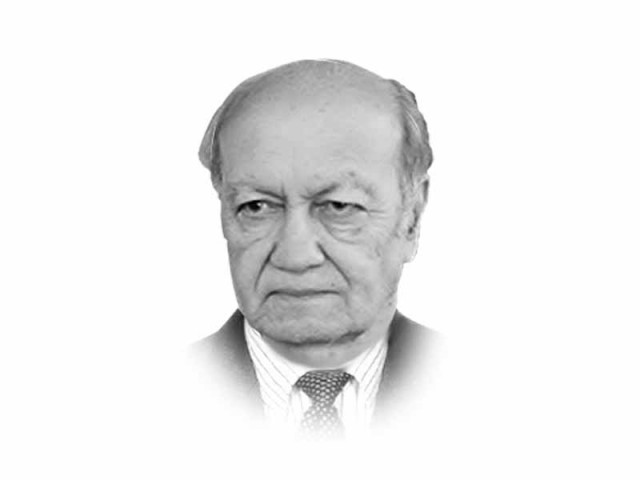Breaking away from status quo
Nisar also criticised Asif’s statement that there is serious need for introspection of security and national policies

The writer is a retired lieutenant general of the Pakistan Army and a former federal secretary. He has also served as chairman of the Pakistan Ordnance Factories Board
It is a different matter that the margin of support for Kulsoom Sharif was substantial that it easily cushioned the abrasive remarks at a critical time. The victory of the PML-N in the by-election, albeit with relatively a lesser margin, was a vindication of Mariam’s strategy and a setback for Chaudhry Nisar. It would raise the morale of the PML-N leadership and their workers at a critical period and strengthen the hold of Mariam Nawaz on party affairs.
Interestingly, it also shows that the Pakistani voter is now looking up to young and dynamic leadership and more interested in seeing new faces that give hope and exude self-confidence rather than fall on tried politicians that have less to offer except personal criticism and foul language that leads to despondency and acute polarisation.
Chaudhry Nisar also criticised Khawaja Asif’s statement that there is a serious need for introspection of our security and national policies. He thought it undermined Pakistan’s national interest and gave credence to the Indian position and won the admiration of its media and politicians. Foreign Minister Khawaja Asif’s recent statement reflects the subtleties that are required in steering foreign policy and the restraints imposed on politicians by the interplay between national power centres.
Perhaps it is the frustration of civilian leadership that it has relatively less influence over foreign policy that motivated him to make a major policy statement in public. Hoping that it would draw support from certain segments of the intelligentsia. The foreign minister was also signalling the international community that Pakistan is reassessing its foreign policy in the light of global and regional changes.
Much has been written and is common knowledge that apart from the power imbalance there are differences in thinking between the civil and military specifically as related to India. Nawaz Sharif, and so was the late Benazir Bhutto, of the view that it is in the interest of Pakistan to normalise relations with India without compromising on Kashmir. The rationale being that Pakistan’s highest priority should be to strengthen its economy and break the shackles of foreign dependence. And this is only possible by opening borders and taking full advantage of Pakistan’s unique strategic location. Imagine for a moment that Islamabad is exercising that option with trade goods and visitors from India, Afghanistan, Central Asia, China and Middle East crisscrossing Pakistan. We have wisely decided to use this option with China but are practically land-locked with three of our important neighbours.
The unfortunate side is that it is the militants and terrorists that seem to optimise Pakistan’s geographic centrality in the region. So it does not take a genius to figure out why Pakistan should seriously revisit its foreign and domestic policies.
For this, major stakeholders and political parties should engage in meaningful dialogue within and outside parliament. The COAS’s recent statement during the visit of a delegation of the Defence Committee of the Senate and the National Assembly suggesting greater interaction between the civil and military leadership is encouraging. Considering that there is hardly any meaningful interaction between the civil society and state institutions.
What, however, gives strength and sustenance to Pakistan, despite these weaknesses that it has a highly talented reservoir of young people in the private and public sectors that remain obscure. It is time that they were brought in the forefront and lead positions.
Last week Serena Hotel management in Islamabad organised a unique session in which talented entrepreneurs and public office holders after their presentations on critical issues facing the country engaged in dialogue with the audience. Many good ideas flowed out of this discussion and the point repeatedly hammered was that Pakistani leadership, media and civil society should look at the present and more so the future.
The CEO of Jazz aptly pointed out that it is troubling that we are mostly looking back and the leadership due to its limited worldview has stagnated the country. High percentage of illiteracy, outdated educational facilities are dragging the country down and leadership fails to give it high priority. Besides, security situation takes away scarce resources that could be spent on these critical areas. Lashari, a bureaucrat whose contribution in promoting culture and giving a new face to Lahore, is well recognised also spoke. He emphasised importance of culture as a dynamic force and a means to promote high values and improve social outlook.
It was a novel approach and an interesting discussion but should be extended at a wider scale — between institutions and within institutions and with civil society. It will strengthen Pakistan and no institution should fear that its position in any way would be compromised. Senate Chairman Raza Rabbani’s recent statement that institutions engage in dialogue also points in the same direction. Raising awareness of the importance of state institutions and ensuring they work in close coordination and pursue policies that are for common good would strengthen Pakistan.
On the external front, by seriously engaging with the US and Afghanistan and addressing mutual concerns relations can be normalised. A solid reappraisal of external policies combined with streamlining and correcting our institutional lacunae will enable Pakistani leadership to steer the country more effectively and deal with outside powers more confidently.
We need ideas and leaders who will lift the country from despondency to an action- and result-oriented society that is good for the country and the region.
Published in The Express Tribune, September 20th, 2017.
Like Opinion & Editorial on Facebook, follow @ETOpEd on Twitter to receive all updates on all our daily pieces.














COMMENTS
Comments are moderated and generally will be posted if they are on-topic and not abusive.
For more information, please see our Comments FAQ